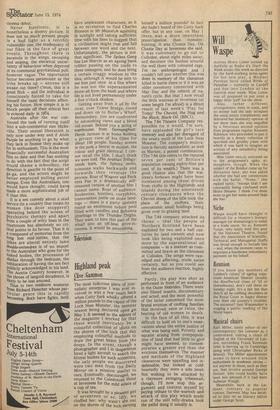Television
Highland peak
Clive Gammon The most ludicrous piece of journalistic enterprise I was ever involved in was a few years back when Cutty Sark whisky offered a million pounds to the captor of the Loch Ness Monster, the monster season being declared open Pn May 1. It seemed to the editors of the magazine I worked for that there would inevitably be a colourful collection of idiots on the shores of the loch that day employing colourful methods to draw the great beast from the deeps. In the event, though a photographer and I in desperation hired a light aircraft to search the littoral bushes for such eccentrics, the only people we discovered were two men from the Daily Mirror on a mission similar to ours. Eventually, discouraged, we returned to the Caledonian Hotel at Inverness for the mild solace of a cup of tea.
It was brought by a pleasant girl of seventeen or so. Idly, we chaffed her; why wasn't she out on the shores of the loch earning herself a million pounds? In fact she hadn't heard of the Cutty Sark offer, but in any case, on May 1 there was a more important preoccupation than monsterhunting. It was Clootie Day. On Clootie Day at Inverness she said, it was customary to go out to .Culloden, about eight miles away, and decorate the bushes around the well there with coloured rags. I'm no anthropologist and I couldn't tell you whether this was done in memory of the clansmen killed in battle there or if it was an older ceremony connected with May Day and the rebirth of nature's cycle. But that I now recall the little waitress at Inverness (at some length I'm afraid) is a direct result of last week's 'Play for Today' The Cheviot, the Stag and the Black, Black Oil. (BBC1).
The 7:84 Theatre Company responsible for it would, I'm sure, have applauded the girl's race memory and also her disregard of the ersatz myth of the Loch Ness Monster. The company's motivation is fiercely nationalistic as well as Marxist, a potent combination. (The 7:84 title refers to the reputed seven per cent of Britain's population owning eighty-four per cent of its wealth.) There was a good chance also that the wai tress's forbears might have been numbered among those driven from crofts in the Highlands and Islands during the nineteenth century clearances when the Cheviot sheep of the title took the place of the crofters, their uneconomic small holdings being given over to grazing land.
The 7:84 company attacked its theme – that the people of Northern Scotland have been exploited for two and a half centuries by land owners and now look like being exploited once more by the supranational oil companies – in a manner as committed and brave as the clansmen at Culloden. The songs were rawedged and affecting, crude satire certainly, but as you could see from the audience reaction, highly effective.
Partly, the play was shot as performed in front of an audience in the Outer Hebrides. There were also filmed inserts, documentary and acted, and the most powerful of the latter concerned the most brutal eviction of crofting families that involved, once or twice, the beating of old women to death.
In the face of all this, it was difficult to hold on to one's reservations about the entire justice of what was being said. Poverty and squalor arising from overpopulation of land that had little to give might have seemed, to contemporaries a greater evil than the evictions themselves. The manner and methods of the Highland clearances were appalling and indefensible, but looked at coldheartedly they were a side issue. Not wishing to be attacked by a claymore swinging tribesman, though, I'll now stop this argument and content myself by paying tribute to the warmth and attack of this play which made run of the mill telly-drama look the pallid thing it usually is.


































 Previous page
Previous page